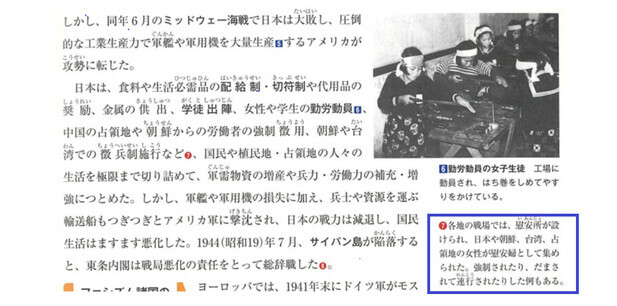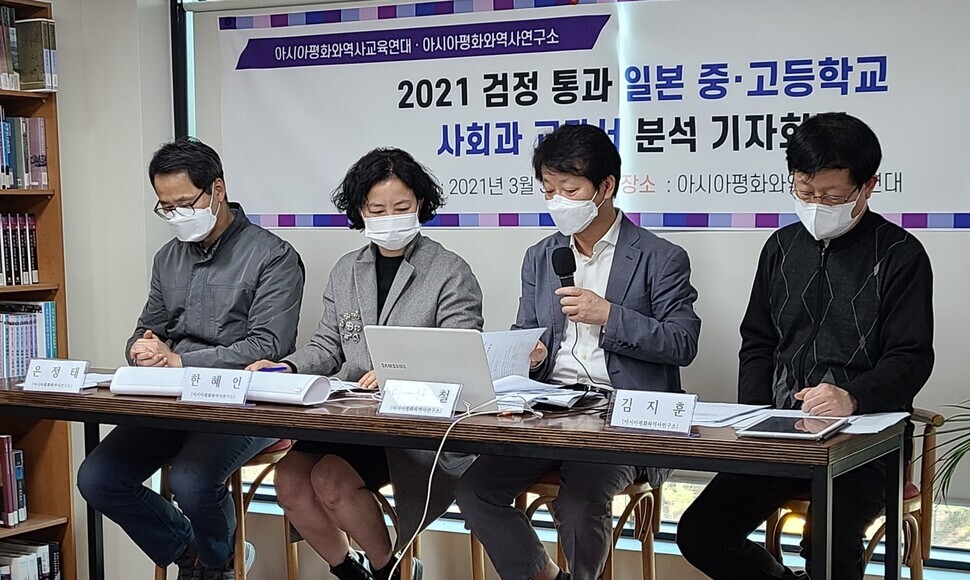hankyoreh
Links to other country sites 다른 나라 사이트 링크
Japanese textbooks don't acknowledge "comfort women" system's coercive nature

Just one of the publishers for the 12 history textbooks to be used by all Japanese high school students as of 2022 mentions the coercive nature of the Japanese military sexual slavery system.
Critics are decrying the textbooks as disregarding the terms of a 1993 statement by then-Chief Cabinet Secretary Yohei Kono, which acknowledged the forcible mobilization of so-called "comfort women" and pledged not to overlook it in history education.
On Tuesday afternoon, the South Korean Ministry of Foreign Affairs (MOFA) summoned Hirohisa Soma, the deputy head of mission at the Japanese embassy in Seoul, to strongly protest the omission. The South Korean Ministry of Education (MOE) also released a statement calling for the textbooks to be revised.
Earlier the same day, the Japanese Ministry of Education, Culture, Sports, Science and Technology (MEXT) announced authorization results for 296 high school textbooks to be used over a four-year period beginning in 2022, including general history and atlases.
For the first time, integrated history textbooks underwent authorization ahead of "general history" courses becoming mandatory next year, combining world and Japanese history with an increased emphasis on modern and contemporary history.
Japanese history had previously been an elective course. Going forward, all high school students in Japan will be required to study history with one of the general history textbooks.
The Asia Peace and History Education Network and Asia Peace and History Research Institute conducted an analysis of the 12 history textbooks (by seven publishers) that were recently authorized for the first time. Eight of them were found to have included references to the military sexual slavery system.
Three mentioned the system in the main text, one in a footnote and four in the form of a reference sidebar. In most cases, mention of the topic amounted to one or two sentences. The longest — three sentences — quoted verbatim from informational materials provided by the Japanese Ministry of Foreign Affairs.
The only one of the general history textbooks to mention the coercive nature of the military sexual slavery system was published by Yamakawa. In a footnote, the textbook said, "Comfort stations were established on battlefields in different regions, and women were recruited as comfort women from Japan and occupied Korea and Taiwan."
"In some cases, they were forced or deceived [into coming]," it continued.
Yamakawa published three general history textbooks in all. The other two either did not address the forcible nature of the system or did not touch on the military sexual slavery issue at all.
The other textbooks stated only basic facts about the topic without any mention of the word "force." One wrote, "Many women were sent to battlefields as comfort women."
In a section of the Battle of Okinawa during the Pacific War, another textbook said, "At least 160 Korean' comfort women' were said to have been present at some 130 military comfort stations."
Other textbooks mentioned only the matter of postwar compensation, without any explanation on the facts of the military sexual slavery system.
"The Asian Women's Fund was a private organization that provided partial compensation to comfort women [survivors] from Korea, the Netherlands and other countries," one wrote.
"A number of issues remained unresolved, including that of the so-called 'military comfort women,'" another said.
A Japanese history textbook published by Jikkyo Shuppan that has remained in use through this year devotes considerable space to the military sexual slavery issue, including a reference to the Kono Statement. Jikkyo's new general history textbook represents a change for the worse — dedicating just one line to the topic.
Observers said that the general history textbooks by themselves convey little idea of the basic truth that the "comfort women" system was an example of wartime sexual violence.
Some noted that the textbooks are a far cry from the pledge included in the Kono Statement in April 1993. That statement recognized the use of force in the mobilization of "comfort women" and their day-to-day lives.
"The recruitment of the comfort women was conducted mainly by private recruiters who acted in response to the request of the military. The Government study has revealed that in many cases they were recruited against their own will, through coaxing, coercion, etc., and that, at times, administrative/military personnel directly took part in the recruitments. They lived in misery at comfort stations under a coercive atmosphere," the statement said.
The statement also said Japan would "face squarely the historical facts as described above instead of evading them."
"We hereby reiterate our firm determination never to repeat the same mistake by forever engraving such issues in our memories through the study and teaching of history," it continued.
The new textbooks misrepresent historical factsSome of the general history textbooks also described imperial Japan's invasions of other countries as "expansions." In textbooks by Yamakawa and Daiichi Gakushu, sections on Japan's forcible annexation of Korea are presented under the title "Japan's expansion into Asia."
"The word 'expansion' is what raised the issue of historical distortions in Japanese textbooks among East Asian countries in 1982," noted Lee Sin-cheol, co-chairperson of the Asia Peace and History Education Network's permanent steering committee.
"The concern here is that Japan's historical perceptions are backsliding to how they were 30 years ago," he said.
The Japanese government's claims about Dokdo, which it describes as "inherently Japanese territory" that is being "illegally occupied by South Korea," were repeated verbatim in six general geography textbooks, 12 civics textbooks and a portion of the general history textbooks. Most of the general history textbooks refer to a January 1905 decision by the Japanese Cabinet declaring Dokdo to be "Japanese territory."
The general history textbooks were also vague in their treatment of the massacres of Koreans committed by Japanese vigilante groups and police in the wake of the Kanto Earthquake of September 1923.
Most of them worded the sections in question in such a way as to obscure the responsibility of the Japanese government or failed to explain the background behind the massacres in terms of discriminatory attitudes toward Korea as a colony.
While the death toll was described as "substantial" or "large," textbooks used the term "killing" or "murder" rather than "massacre," which could give the impression that the acts were isolated.
In a previously released statement, the South Korean government said, "We strongly protest the authorization of textbooks that are based on a self-centered historical view and do not relate the past as it happened."
The MOE also released a statement of protest.
"The first step toward undoing the tangled knot of South Korea-Japan relations lies in correcting distortions of history," it said.
"For the sake of the next generation, the Japanese government must amend its distorted textbook content," it added.

In a press conference Tuesday, the Asia Peace and History Education Network and Asia Peace and History Research Institute said, "There have been clear efforts in East Asian countries recently to understand their history from a world historical perspective, and there had been high hopes for the general history [textbooks] in that regard."
They went on to say, "The general history textbooks that have been made public whitewash Japan's imperial aggressions and the crimes of colonial rule."
"[South Korea, China and Japan] must affirm and broaden a shared perception based on proactive dialogue," they added.
By Kim So-youn, staff reporter
Please direct comments or questions to [english@hani.co.kr]

Editorial・opinion
![[Column] Has Korea, too, crossed the Rubicon on China? [Column] Has Korea, too, crossed the Rubicon on China?](https://flexible.img.hani.co.kr/flexible/normal/500/300/imgdb/original/2024/0419/9317135153409185.jpg) [Column] Has Korea, too, crossed the Rubicon on China?
[Column] Has Korea, too, crossed the Rubicon on China?![[Correspondent’s column] In Japan’s alliance with US, echoes of its past alliances with UK [Correspondent’s column] In Japan’s alliance with US, echoes of its past alliances with UK](https://flexible.img.hani.co.kr/flexible/normal/500/300/imgdb/original/2024/0419/2317135166563519.jpg) [Correspondent’s column] In Japan’s alliance with US, echoes of its past alliances with UK
[Correspondent’s column] In Japan’s alliance with US, echoes of its past alliances with UK- [Editorial] Does Yoon think the Korean public is wrong?
- [Editorial] As it bolsters its alliance with US, Japan must be accountable for past
- [Guest essay] Amending the Constitution is Yoon’s key to leaving office in public’s good graces
- [Editorial] 10 years on, lessons of Sewol tragedy must never be forgotten
- [Column] A death blow to Korea’s prosecutor politics
- [Correspondent’s column] The US and the end of Japanese pacifism
- [Guest essay] How Korea turned its trainee doctors into monsters
- [Guest essay] As someone who helped forge Seoul-Moscow ties, their status today troubles me
Most viewed articles
- 1[Column] The clock is ticking for Korea’s first lady
- 2Hong Se-hwa, voice for tolerance whose memoir of exile touched a chord, dies at 76
- 3[Column] Has Korea, too, crossed the Rubicon on China?
- 4After 2 months of delayed, denied medical care, Koreans worry worst may be yet to come
- 5[Correspondent’s column] In Japan’s alliance with US, echoes of its past alliances with UK
- 6US overtakes China as Korea’s top export market, prompting trade sanction jitters
- 7All eyes on Xiaomi after it pulls off EV that Apple couldn’t
- 8[Photo] Smile ambassador, you’re on camera
- 9Samsung barricades office as unionized workers strike for better conditions
- 10S. Korea “monitoring developments” after report of secret Chinese police station in Seoul